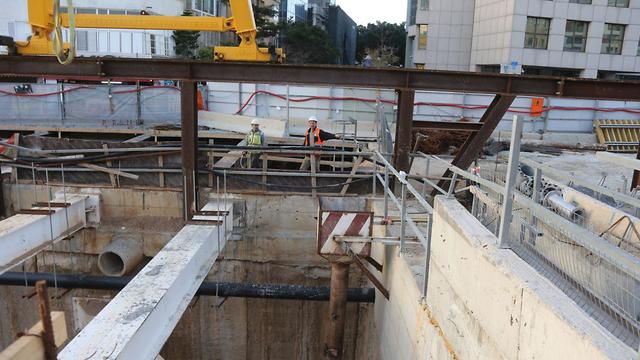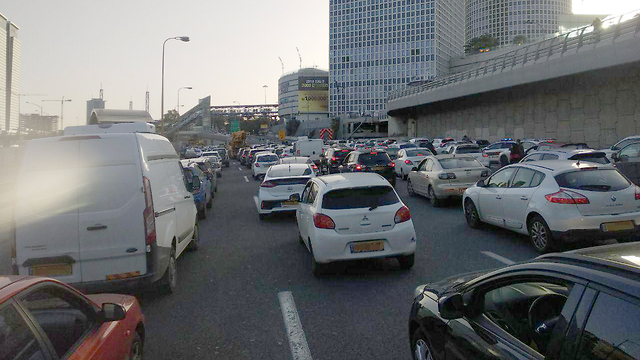
With just two months to go until the elections for Israel's parliament, and at the height of the election campaign, the Prime Minister's Office has released a detailed document entitled "Infrastructure for Growth for 2019." The plan comprises a total of NIS 196 billion (approx. $54 billion) in investment in infrastructure for the coming years.
Nonetheless, given the budget cuts expected to take place once the new government is formed after the elections, it is not at all certain that many of the items will ever make it out of the planning stages. It is also unclear whether Benjamin Netanyahu will be the prime minister to cut the ribbon on these projects.
The list draws together all the infrastructure projects currently in the execution, budgeting or ministerial approval stages. It includes 207 projects in total, some privately run, whose execution begins or ends between 2018 and 2022.
The list includes every infrastructure project estimated to cost more than NIS 100 million, based on government ministry reports, that has undergone economic feasibility testing, or that appears in a government decision or in a budget summary. Roughly half of the infrastructure budget – NIS 98 billion – will be financed by PPPs (public-private partnerships).
The list is an update of an outline published in September 2017 that included 147 projects worth NIS 116 billion. The updated infrastructure plan includes the expansion of a number of projects and the amalgamation of projects from other ministries, including defense, finance, labor, social affairs, education and communications, as well as the Israel Ports Authority.
The Prime Minister's Office emphasized that the concentration of the projects in one document is intended to create a common language for infrastructure, and allow the public to monitor the implementation of the projects to ensure that they meet the promised deadlines. "We have created a revolution in Israeli infrastructure," said Netanyahu. "We can see it on the roads, trains, gas from the sea, etc. This momentum will further increase more in the coming years."
The new list includes an extremely significant increase in investments in public transportation, to the tune of NIS 100 billion. The improvements include:
• A light rail to connect the central areas of Petah Tikva, Bnei Brak, Ramat Gan, Tel Aviv and Bat Yam at a cost of NIS 16 billion. The project is expected to be completed in 7 years.
• A light rail line in Jerusalem from the Ramot neighborhood in the north to the Gilo neighborhood in the south that extends to Emek Refaim in the heart of the city. The construction will cost NIS 10 billion and is also expected to take 7 years.
• A new entrance road to Jerusalem from the west, connecting Highway 1 in the Givat Shaul area to the Givat Mordechai interchange on Menachem Begin Boulevard. The road will include two tunnels: one under the Har Nof neighborhood and the other under the Yefe Nof neighborhood. The project will be completed within 4 years and cost NIS 1.1 billion.
• Expansion of the highways leading into Tel Aviv (an addition of three highways to the north, east and south) at a cost of NIS 4.7 billion.
Other projects include:
• The construction of two combined gas and water turbine power stations totaling NIS 4.8 billion, as a massive overhaul of the electricity market.
• The establishment of a new hospital in Be'er Sheva within five years, at unknown cost. Improvements to psychiatric hospitals.
• Construction of 70,000 sqm of Ministry of Finance offices at a cost of NIS 700 million, which is expected to be completed within four years.
• The establishment of Ministry of Defense intelligence complex at Shoket Junction, near Be'er Sheva and the transfer of most intelligence units to that location. The cost of the project has not been published, and it is expected to be completed within five years.
• Establishment of a facility to recycle energy from waste. The facility will handle 1,500 tons of waste per day and be built within three years.
• The construction of 2,550 classrooms and kindergartens annually by the Ministry of Education; reinforcing 80 structures and making 127-132 schools accessible annually.
The Ministry of Industry, Trade and Labor only reported on the planning and construction of 350 day care centers. The Ministry of Communications only reported on a tender for frequencies for 4 and 5G cellular technology. There was no mention of Internet infrastructure and fiber optics installation.


















